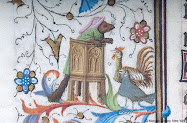 delighted by the many ways the web is dissolving both geographical and temporal barriers. I can access ever-growing digital collections of documents and texts dating back to the twelfth century, making it possible to undertake original research without leaving my study. And there are some beautiful sites where I can view photographic images of medieval manuscripts, invaluable because they show not just the primary content but also the marginalia and annotations that provide critical clues to the history, interpretation, dissemination and multiple purposes of a particular text. (For a quirky example, see this tale of two lions and the change of noble ownership they represent.)
delighted by the many ways the web is dissolving both geographical and temporal barriers. I can access ever-growing digital collections of documents and texts dating back to the twelfth century, making it possible to undertake original research without leaving my study. And there are some beautiful sites where I can view photographic images of medieval manuscripts, invaluable because they show not just the primary content but also the marginalia and annotations that provide critical clues to the history, interpretation, dissemination and multiple purposes of a particular text. (For a quirky example, see this tale of two lions and the change of noble ownership they represent.)And through the self-publishing miracle that is the blog, I’ve been able to make contact with some of the leading scholars in my areas of interest. I’ve participated in challenging discussions about specific historical interpretations and theoretical approaches; and I’ve debated the roles – both real and ideal – of the historical profession in contemporary society. Most recently, I’ve come across the innovative Carnivalesque project, which each month showcases a selection of recent posts on ancient, medieval and early modern history from professors, graduate students and independent scholars. Writers nominate their own or others' best posts for inclusion and hosting moves to a different blog with each edition, providing a variety of perspectives on the monthly theme. It’s not constrained by the rigorous peer review process (and glacial publishing timelines) of a traditional academic journal, but it is a credible forum where dubious scholarship or poorly supported claims will be quickly challenged by people who are experts in their fields.
There are loads of good blogs on medieval and early modern history, from the serious-minded – where posts often feature an impressive depth of detail and careful interpretation reminiscent of scholarly articles – to the hilariously light-hearted (Got Medieval and Geoffrey Chaucer Hath a Blog spring to mind). I’ll soon be adding my own favourites to this site, so you’ll be able to check them out for yourself. Nominations are also welcome, as I’d hate to think I’m missing out on any gems!
Picture credit: Crusade scene from the Hours of Pierre de Bosredont, France, ca.1465 (Pierpont Morgan Library)




No comments:
Post a Comment